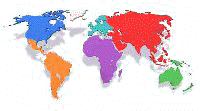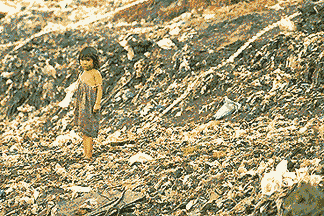The Broadcast Media's Growing Role Because of satellite links which now enable broadcast news organizations to originate live As a result, Marshall McLuhan's reference to the post-television world as being a single "global village" is gaining new credence and Shakespeare's famous line, "all the world's a stage," has taken on an interesting new twist in meaning. But, beyond the philosophical dimensions of global television communications there are some dramatic, political implications. Even before today's worldwide satellite links were possible, the growing effect of broadcast news technology on national and international politics was becoming increasingly evident. A Quick Look BackBecause television is a closeup medium and a medium that seems to most readily involve emotions, it is most effective when it is revealing the plights of people. It was probably the appalling footage of the Nazi death camps that first demonstrated the power of motion pictures and television to affect the collective consciousness of a world audience. In the United States during the 50's and 60's the power of television to stir the consciousness of large numbers of people was demonstrated in another way. Night after night graphic news footage of the civil rights struggle was brought into U.S. homes. Even though the technological ability of television news to quickly and effectively cover events was in an early stage, the role of television news as an instrument for social and political change was further established. Years later, this role took was to take on a new and even more controversial dimension during the Vietnam War. Reading about war was one thing; but war took on a deeper and more unsavory dimension when it was exported directly into U.S. living rooms night after night by television. Public opinion eventually turned against the war and to some measure against President Johnson who was associated with it. As a result of the public opinion backlash during these times, the Pentagon was thereafter much more careful to control what foreign correspondents and TV crews would be allowed to see and report. It was during this time that President Carter brought the issue of human rights to the center of his foreign policy, and, to some degree, to the center of international politics. "Human rights is the soul of our foreign policy," Carter said. "Of all human rights the most basic is to be free of arbitrary violence, whether that violence comes from government, from terrorists, from criminals, or from self-appointed messiahs operating under the cover of politics or religion." After 1980, there was a shift in emphasis. In Contrast to the words of Carter, President Reagan said: "I don't think you can turn away from some country because, here and there, they do not totally agree with our concept of human rights." But, even if human rights are no longer the "soul" of our foreign policy, they appear to have emerged as the "soul" of television news. The transgression of human rights (in one form or another) has been the focus of many, if not most, major international television news stories. Such stories have altered world politics. Although many examples could be cited, South Africa and the Philippines represent good examples. The Media's Effect in South AfricaAlthough South Africa can hardly be viewed as one of the world's major transgressors of press freedom, the South African government has long been nervous about an uncontrolled press-- especially an uncontrolled black press. Some 90 laws have been written which, in one way or another, restrict press freedoms. As a result of these laws, scores of reporters in South Africa have been jailed--and some have suffered fates far worse--for reporting things that the government has viewed as not supporting its policies. Largely because of this censorship, whites in South Africa knew little about the plight of blacks in their own country--a situation not unlike the one that existed in the United States forty years ago. But then a new element was introduced in South Africa: the foreign media. In South Africa's carefully controlled news climate, the arrival of the foreign news media had an unsettling and disruptive effect. Suddenly, the human rights abuses that had for long gone unreported, were brought before the eyes of the world. Before November of 1985, almost all of the laws affecting press freedom were aimed at South Africa's domestic reporters. But in November, South Africa started restricting the foreign press--primarily television cameras--from reporting of events taking place in black areas of the country. The stated intent was to reduce violence. But by some accounts the effects of the censorship have actually intensified frustration and violence. The effect of all this on international politics has been significant. Economic sanctions against South Africa by many countries are one example. But, beyond this, a stirring of the world's consciousness against human rights violations resulted. This finally resulted in some major changes taking place within the government of South Africa. The story in the Philippines developed somewhat differently. The Media's Impact in the PhilippinesProbably nowhere have the effects of instant, electronic newsgathering techniques been more dramatic than in the Philippine revolution. One of Philippine President Marcos' advisors noted after the President fled the Philippines that if it hadn't been for what television news revealed he had no doubt that Marcos would have retained his position as President. I made three trips to the Philippines to investigate the impact of both the foreign and domestic news media's influence on the revolution. Because the events which transpired in late 1985 so clearly illustrate the various ways in which the broadcast news media can now shape international politics, the events in this revolution are worth examining in some detail. Ferdinand Marcos was initially elected President of the Philippines in a democratic election in 1965. But, in order to hang onto his leadership he had to declare martial law and suspend a constitution that would have otherwise required him to step down after two terms. (Later, he would again alter his country's constitution so that he could override any parliamentary decision that he didn't like.) As
a result he maintained his position for 20 years. During these two decades
he and his family had amassed a personal fortune estimated in the billions.
Despite hundreds of millions of dollars from the United States each year, Marcos' government was falling increasingly into debt; and, even as his personal fortunes rapidly escalated, the majority of his people were living in poverty. Because of Marcos' control over the country's media, these transgressions were either not publicized or were accounted for by carefully constructed, official explanations. Some 25 journalists "disappeared" in the Philippines after losing favor with the Marcos regime. One radio announcer was reportedly shot while he was on the air. Anyone who openly criticized the Marcos government was at risk. But media people were not the only target. On one flight to the Philippines--a rather long 16-hour flight--I found myself reading a newspaper from Manila, in the Philippines. I came across a curious article reporting on a well-known Catholic priest who had without explanation "gone on a trip." I knew that 80% of the people in the Philippines are Catholic, and the church is the most powerful social force in that country. The article explained how, although very popular and outspoken, this priest had the strange habit of making unannounced fishing trips. It went on to document how he had disappeared on occasions in the past. The story assured readers that the priest would undoubtedly reappear at any moment with a full explanation. I thought no more about it until I attended church the following Sunday with a friend, which by total coincidence happened to be the church of the priest I had read about on the plane. (In a country with 7,000 islands and many more Catholic churches, this was a coincidence of the first magnitude.) The person officiating explained to a worried audience that the priest had been abducted a few days before in broad daylight on a busy street in Cebu (one of the largest cities in the Philippines). It appears that the very popular but outspoken priest had said something that someone didn't like. There has been no trace of him to this day. Click on "more" for the second half of this section.) |
 programming from any part of the globe, the entire world is becoming one, giant sound stage for television news.
programming from any part of the globe, the entire world is becoming one, giant sound stage for television news.